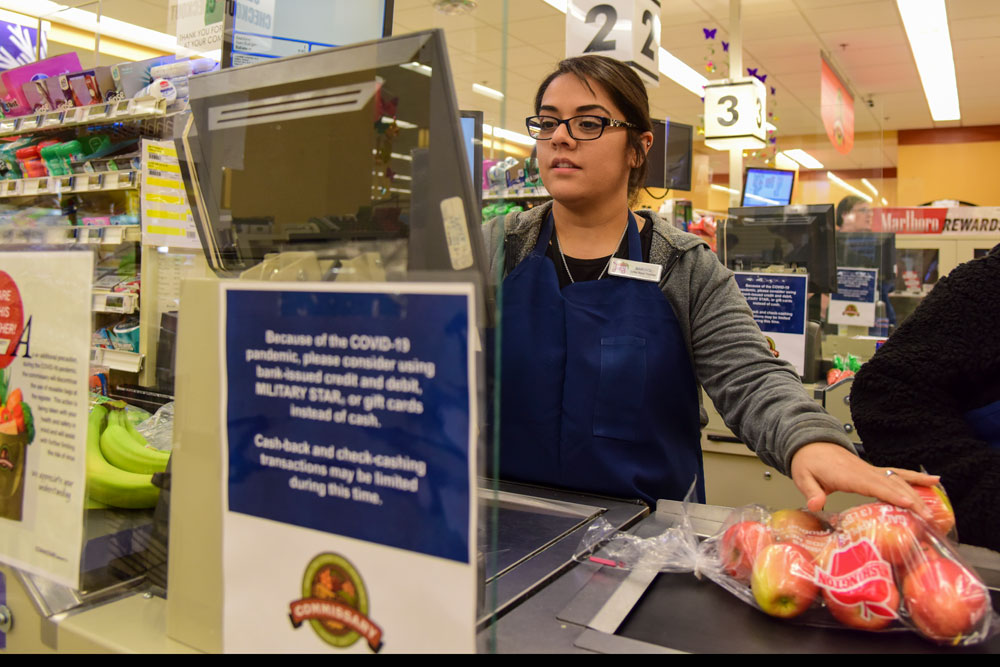
April 12, 2020; Washington Post
Growing numbers of the nation’s grocery workers are succumbing to the novel coronavirus, reports Abha Bhattarai in the Washington Post. To date, at least 41 grocery workers have died: “They include a Trader Joe’s employee in New York, a Safeway worker in Seattle, a pair of Walmart associates near Chicago, and four Kroger employees in Michigan, as well as employees at meatpacking plants and food processing facilities around the country.”
Nationally, more than 1,500 supermarket workers have tested positive for the coronavirus, according to the United Food and Commercial Workers (UFCW), which represents 900,000 grocery workers in the 3-million-person industry. Nearly 3,000 UFCW members are not working because they are quarantined, hospitalized, or awaiting test results.
The virus takes not just a physical, but a psychological toll. “Many grocery workers,” Bhattarai writes, “report being stressed and scared, especially as their colleagues fall ill.” Bhattarai notes that medical workers have the highest risk of exposure, but she adds that “grocery workers also come in close contact with large groups of people, often without meaningful protective gear.”
Some protective measures have been taken. For instance, “Chains such as Kroger and Safeway have begun providing masks and gloves…and countless large and regional chains have installed plexiglass shields at cash registers and signs encouraging social distancing.” But many risks remain.
“Grocery workers are risking their safety, often for poverty-level wages, so the rest of us can shelter in place,” notes John Logan, director of labor and employment studies at San Francisco State University. “The only way the rest of us are able to stay home is because they’re willing to go to work.”
UFCW president Marc Perrone is encouraging state governments to categorize grocery workers as first responders, so they get priority testing and protective equipment such as masks.
Sign up for our free newsletters
Subscribe to NPQ's newsletters to have our top stories delivered directly to your inbox.
By signing up, you agree to our privacy policy and terms of use, and to receive messages from NPQ and our partners.
“We believe in our health-care professionals being first, but we also believe that if we’re going to slow the transmission, that we need to start flattening the curve in those areas where grocery employees are literally coming face-to-face with thousands of people,” Perrone says.
In some cases, lawsuits are already being filed. Bhattarai relates that, “Wando Evans had worked at a Chicago-area Walmart for 15 years when managers sent the 51-year-old home March 23 because he was displaying flu-like symptoms…two days later, he was found dead.” His brother, Toney Evans, filed a wrongful-death lawsuit on Monday against Walmart, alleging that the store “didn’t provide protective masks and gloves, adequately disinfect the store, or keep workers apprised of their colleagues’ illnesses.” A second store employee, Phillip Thomas, 48, died four days after Evans.
Bhattarai also reports that employees at a Whole Foods Market in Virginia say they’re afraid to go to work. They want the store to monitor how many people can be inside at any one time and to make accommodations for older and more vulnerable workers.
Bhattarai adds that a Shoppers Food store in Maryland does have such limits, is providing disposable gloves, and upped wages by $2 an hour. But she adds that employees there say the store hasn’t been able to find masks or adequate sanitizer.
In Seattle, Bhattarai notes that both Trader Joe’s and Kroger employees report that they have been told not to discuss issues of coronavirus exposure among employees to shoppers.
Meanwhile, the fear employees feel is palpable. As one Seattle employee tells Bhattarai, it never occurred to him that the job he applied for 13 years ago to support his wife and infant could one day put his life at risk. “Nobody told us,” he explains, “that when the world falls apart, it’s going to fall on our shoulders.”—Steve Dubb












